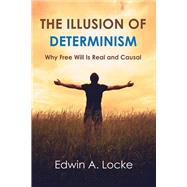The Illusion of Determinism Why Free Will Is Real and Causal
, by Locke, Edwin A.- ISBN: 9781543914221 | 1543914225
- Cover: Paperback
- Copyright: 11/3/2017
Determinism is the doctrine that everything we think, feel, believe, and do is caused by factors outside our control—that we have no choice regarding our character, our thoughts, our actions, our lives. There have been many forms of determinism but the one that is most popular today is based on neuroscience and physics with the enthusiastic support of many psychologists, philosophers, and physical scientists (e. This version argues that we are controlled by our physical brains with the brain being set in motion by environmental factors. The debate continues because many people disagree with determinism and assert that they have, in some form, free will. Determinists insist that such a belief represents "folk psychology," an illusion held by people who are ignorant of what science has allegedly proved.
Determinists typically believe that:
-Consciousness is the same thing as brain activity (as opposed to requiring a brain).
-The conscious mind, though real, plays no significant role in human life.
-The human mind is not significantly different from that of the lower animals such as chimpanzees.
-All causes are material (or mechanical).
-Goal-directed action applies equally to people and machines.
-The concept of a self or the self as a causal agent has no intelligible meaning.
-Key neuroscience experiments have proven that intentions to act appear only after the brain has already decided what to do.
-Determinism is not only compatible with objective knowledge but is also the only guarantee of objective knowledge, because it is based on scientific truth.
-Determinism has to be either proved or disproved (rather than being an axiom) based on philosophical and/or scientific arguments.
-Free will, at best, is a necessary illusion.
On the other side of the coin, various free will advocates typically believe that:
-Elementary particles which make up our brain act at random, thus refuting causal necessity
-Free will and determinism are compatible.
-Religion validates free will.
In this book, published in 2018, I show that all of the above beliefs are mistaken. I will also show that free will is, as many have claimed, self-evident, even though most people have not validated it or correctly identified what it consists of—what it is, and what it isn't.
NOTE: I was recently included in a free will documentary which purported to be an overview of all the different positions, but, it was very biased in favor of determinism. Despite having taped me for two about hours, the editor omitted about 90% of what I said including almost all the most important points that I made such as the fact that determinism involves an insuperable contradiction. So you really need to read the whole book to get the full argument. (BTW: In, my book I mention the late, world-famous physicist, Stephen Hawking. I said he was a Nobel Prize winner but he was not, though his core ideas were validated after his death).
Determinists typically believe that:
-Consciousness is the same thing as brain activity (as opposed to requiring a brain).
-The conscious mind, though real, plays no significant role in human life.
-The human mind is not significantly different from that of the lower animals such as chimpanzees.
-All causes are material (or mechanical).
-Goal-directed action applies equally to people and machines.
-The concept of a self or the self as a causal agent has no intelligible meaning.
-Key neuroscience experiments have proven that intentions to act appear only after the brain has already decided what to do.
-Determinism is not only compatible with objective knowledge but is also the only guarantee of objective knowledge, because it is based on scientific truth.
-Determinism has to be either proved or disproved (rather than being an axiom) based on philosophical and/or scientific arguments.
-Free will, at best, is a necessary illusion.
On the other side of the coin, various free will advocates typically believe that:
-Elementary particles which make up our brain act at random, thus refuting causal necessity
-Free will and determinism are compatible.
-Religion validates free will.
In this book, published in 2018, I show that all of the above beliefs are mistaken. I will also show that free will is, as many have claimed, self-evident, even though most people have not validated it or correctly identified what it consists of—what it is, and what it isn't.
NOTE: I was recently included in a free will documentary which purported to be an overview of all the different positions, but, it was very biased in favor of determinism. Despite having taped me for two about hours, the editor omitted about 90% of what I said including almost all the most important points that I made such as the fact that determinism involves an insuperable contradiction. So you really need to read the whole book to get the full argument. (BTW: In, my book I mention the late, world-famous physicist, Stephen Hawking. I said he was a Nobel Prize winner but he was not, though his core ideas were validated after his death).







